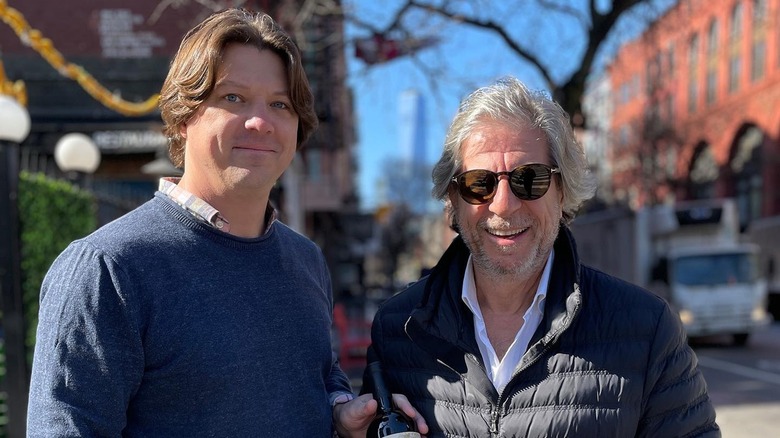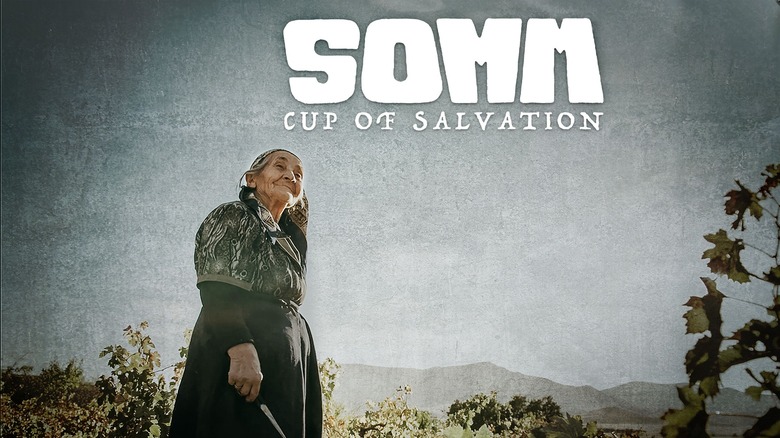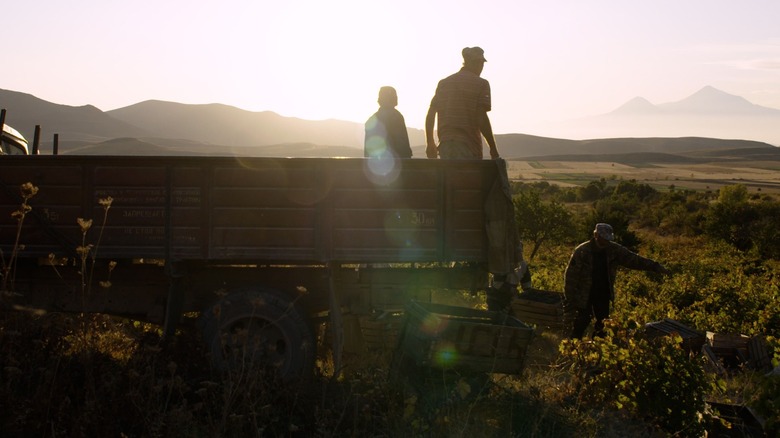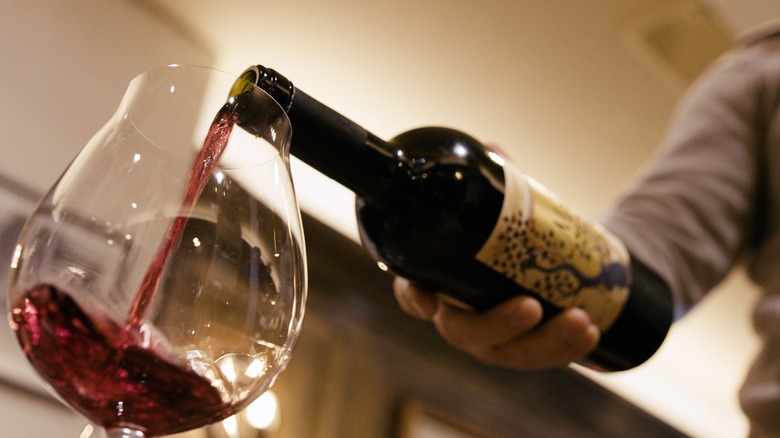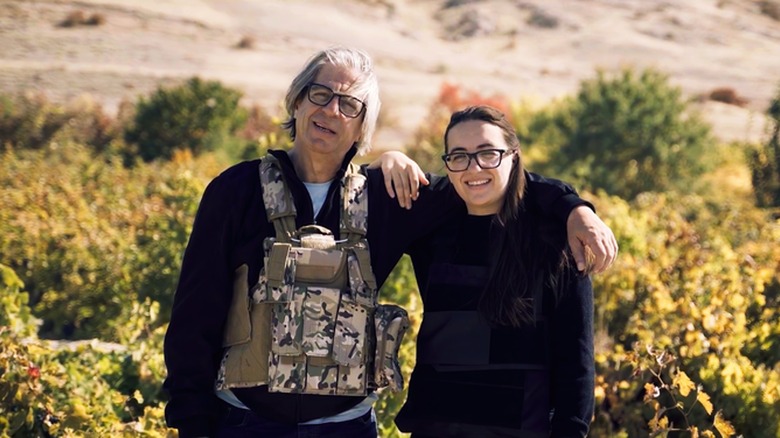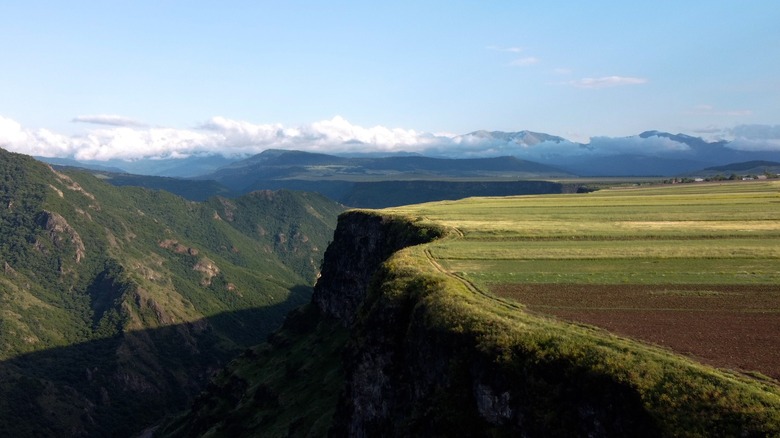Vahe Keushguerian And Jason Wise Are Changing The World Through Wine - Exclusive Interview
It's rare to encounter a story about the food and beverage world that inspires a profound, global sense of hope — both in the quality of what is being produced as well as in the potential for that product to change the world. That is the story that filmmaker Jason Wise is telling in "Cup of Salvation", his latest addition to the SOMM documentary series, alongside, his muse and main character, winemaker Vahe Keushguerian.
We recently had an opportunity to speak with Wise and Keushguerian for an exclusive interview about the project of making modern-day wine in Armenia and the potential both see in wine's ability to break down cultural barriers.
Keushguerian and Wise spoke from different corners of the globe, which was fitting, given the film's mission of demonstrating how little there is separating us — if only we could all gather over a bottle of wine and listen to one another. Here, Wise shares his perspective as a filmmaker with a rich knowledge of the modern wine world and Keushguerian provides deep insight into his mission to make Armenia a cultural destination that honors the ancient history of winemaking in the region.
The paths that lead to wine
How did both of you first find yourselves connected to the world of wine and what has changed since that beginning?
Keushguerian: I started in the Bay Area in 1990. I was in the restaurant business [in] college — waiter, manager, bartender, the whole thing. When I graduated, I chose to open a restaurant ... and then at some point, it was too restricting ... I wanted to get some breeding, and I decided that importing wine would be a good way to do that. I had lived in Italy already. I was fluent in Italian. I started importing Italian wines and some French wines. I did that for four years. I guess that wasn't enough, [because] I decided I had to live in Tuscany.
My ex-wife and my children, we all went to Italy. I made wine there in Tuscany, in Puglia. In the meantime, I made a trip as a tourist to Armenia, and I realized the importance of Armenia in viticulture — the history. I took some land and planted vineyards, and I came back in 2009. It was the right time — the rebirth, or the Renaissance of Armenian viticulture, after Soviet rule of 70 years.
A lot changed in the meantime. When I was selling Italian wines, you couldn't convince anyone in the Bay Area to buy Barolo ... French wines were selling, but Italian wines weren't. I saw the transformation. Austria became a thing in my time. Argentina, with Malbec, became a thing during my tenure as a wine merchant and wine producer. At some point, I figured that Armenia would. It wasn't intentional, but it was like chasing something. I didn't know what I was chasing, but Armenia had a narrative. I don't have a homeland, but I adopted it as my homeland.
Wise: The first movie I ever made, ["SOMM"] ... I made quite by accident... Every time I made another film [having] to do with wine, I fell more and more in love with what wine actually could be and [what wine] actually was — something that [sits] at the center of the table and [makes] you stand in the dirt where it's from and connect with people. I wanted to make a film that showed that. When I set out to make ["Cup of Salvation"], it was the story of religion and wine and how [those] connected, and how wine became a commercial product.
Cultural transformation
In thinking about how food and beverages can put countries on the map, what is your hope for the way that wine production in Armenia will change the worldwide perception of Armenia?
Wise: When I was in seventh or eighth grade, I was in history class and we were going through our [text]book ... and we came upon a chapter about ancient people. [When my teacher] got to Armenians, she talked about how they're one of the most ancient people in the world, and there was a genocide ... And that was it. [Then] we moved on.
The reason that pertains to the question is, [depending on where you grew up], you may not have ever even heard of Armenia, and if you have, you might ask, "Did they have a genocide?" Here's the difference. If I say to you, "I'm going to Argentina," somebody goes, "Oh, man, they have great steaks down there." I can tell you right now, Argentina has had as much political upheaval and tragedy as any other country, but you think of food and wine when you think of Argentina.
Why is that? Argentina has wine and food, and they do it well. Same with France. France has enough problems to fill a bucket, but you think, "Oh my God, France? Wonderful. How was the wine?"
If Armenia can be known for the wines that are being produced there, that Vahe is doing, if this country can be known for how good they are as winemakers — and that goes back to antiquity, because they're ancient craftsmen. Herodotus wrote about how good they were as winemakers. It's not a new phenomenon. It could make people look at Armenia as a tourist destination, a place for food, a gastronomic, cultural depository of history.
That's the most important thing. I want there to be a face to these people that is not just a BBC headline that they might be at war with some other country you've never heard of. [Instead], it should be, "These guys invented wine." It should be very important. I want there to be a recognition to that name, and if this film can help a little bit, that would mean a lot. Vahe, what do you think? That's a big question.
Keushguerian: We can go back and look at when Mondavi built a winery [in Napa], when Napa was nowhere close to [what] Napa [is now]. A lot of people thought he was crazy. [It's] the same way Vegas became Vegas — because one man had an idea to do something. If I take [Napa and Vegas] as, let's say, an indication of how wine can be a catalyst for the changes that follow, Armenia is on the right track. In 10 years... [Amernia] went from having wines that were basically undrinkable — defects, oxidized, funky, dirty — to now sniffing Areni vino glasses. I'm almost afraid of what the next 10 years will bring.
Two hotels are being built, and my winery will be built next year. All of a sudden, there will be people going to the wine country ... There is a cultural shift. The transformation has been incredibly wonderful. Now, [Amernians] have their own places, their own cultures of wine ... only positives will come out of it, because wine brings out the best in us. People don't have fights drinking wine.
Breaking down barriers
The film talks about the potential for wine to help bridge cultural barriers. What are both of your perspectives about the ability to forge connections through food and wine?
Wise: Wine is the only thing that you can eat or drink that takes years to create. [When] you eat an oyster, you do get some terroir that tastes exactly like where it's from, but an oyster is so ephemeral. It's very quick and then it's over. A wine — a glass of wine, a bottle of wine — you sit at a table with people and there is a loosening up process. It's not just the alcohol; it's the experience of [opening it, sitting there, and talking], you break the ice.
Food is quick. Food is a great story, but wine takes some time. There is no single bottle of wine that's ever been put in front of more than two people where [one doesn't] at least acknowledge, "What are we having?" or "What is this?" It's almost ritualized.
I have traveled to dozens of countries. I have filmed all over the world. I have found that wine, at the center of a table, is the fastest way to ask somebody about their past, their history. It's easy. There's no awkwardness. It is an easy conversation to talk to somebody openly about life and history when you're drinking wine, and often be able to joke about it. The alcohol certainly helps, but wine has a tremendous ability to make the table feel smaller. When you're there and able to look someone in the eye, you don't get up and run away. You don't leave. You sit there and you talk to somebody. Vahe, what do you think?
Keushguerian: I share what you said: [Wine] makes it easier. I might even say that on a political level, in diplomacy, [wine] greases the wheel a bit if people are tight, because at the end of the day, we are all the same humans. We have different tags, different religions, different countries. I always say the middle-class Iranian family has more in common with a middle-class Armenian family or Afghani family, because we have the same problems. We have the same parent issues: education, children, and global warming.
Honestly, we have a lot happening that we need to come to terms with, to sit at the table to resolve global issues. I'm not saying wine will do it, but if an Iranian diplomat opened [a bottle of wine] with a French ambassador, even [just] on a friendly level, the conversation would shift. It might be awkward because all of a sudden the French would feel superior because [they're drinking] a lovely [French] wine and there's this disjointedness [because] no Iranian diplomat is able to [open a bottle of Iranian wine] and say, "This is from Kyrgyzstan. It is these grapes. We have these gorgeous hillsides."
The day will come. I know it will come. It might be funny now, but pretty soon it'll be known about. Wine is a beautiful medium to create that, because the minute we open a French wine or an Italian Barolo, it takes us immediately to the villages of Piemonte, to the nice two-star Michelin restaurant, or even the trattoria that serves stewed rabbit.
A family legacy
Vahe, what does it mean for you to produce wines alongside your daughter, Aimee? How does crafting wine with your family contribute to the project of returning Armenian and Iranian cultural significance back into the wine world? More broadly, since wine is a fairly male-dominated industry, what does it mean for your daughter to have a central role within it?
Keushguerian: Aimee was brought up to do what she wanted to do — to be passionate about what she does. There were no limitations. She was brought up in the wine country. She lived in Tuscany. [There was always] wine on the table with the family. She was brought up in that atmosphere, and she was the curious type. She was a bit of a rebel. We would butt heads, and I had to figure out how not to butt heads. Wine is a very family business. It's a legacy you pass on, not intentionally, but what am I going to do — plant a vineyard that gives good fruit in 15, 20 years? It's not for me; it's for my son, Luca, and my daughter, Aimee. They are the ones who are going to continue.
Aimee is in the right place at the right time. She realizes it, too. There's a sense of responsibility that she feels. She has to take the next generation to another level. She's trying to catch up very fast. She has a very good palette. Both of [my children] do. Now, Aimee's doing an MBA in Beaune, Burgundy. I'm really proud that she's doing that, because she will come back a different person. She will come back with a huge perspective about terroir, about villages, about Burgundy, about how they [make wine], about how they understand it. She will come back and be an important part of the change that will come in the farm. There are a few other young women who are taking the reins of winemaking. In Armenia, we will see quite a few [vineyards] where women will be taking charge, like everywhere else in the world.
Wise: Aimee is so talented. I can't put it into words. I have never, in my 16 or 17 years of working with some of the greatest winemakers in the world, seen somebody go from here to [there] so fast. She could be at the Domaine de la Romanée Conti and be speaking in a technical level of proficiency that I have never seen somebody [learn] so quickly. Aimee is going to do a lot, not just for Armenia, but for the whole wine business. We need more people like her.
A grape like no other
In the film, after first sampling Armenian wine, several of the sommeliers in Napa remarked on its singular taste. Did that response reflect your expectations? How would you describe the flavor profile for someone who has never enjoyed Armenian wine before, particularly with Iranian grapes?
Wise: Armenian wine is what drew me to this story. I had [some] here in Los Angeles for the first time, and I was looking over my shoulder like, "How is this bottle $19? I don't understand how this is this good." I went to Armenia and my head exploded from all the wine that was not coming to the United States. That is why ["Cup of Salvation"] exists, first and foremost, because the wine is excellent. The wine surpasses the story.
[When] talking about Armenian wine and the Iranian grapes [in the film], I like the fumbling, because you can't really put it into place. You can say, "This is kind of like a lighter southern Rhone," and then you're like, "But no, it's not. No, it's more like a northern Rhone. It's like Syrah. No, it's not," because you can't really [place it]. You can't. You can say, "This style reminds me of the best Grenache I ever had in the Languedoc," but [that's not quite it.] That's why it's so difficult to answer, "What does it taste like?"
Areni is one of the most astounding red grapes that I have ever had, because it has the potential — and already is living up to its potential — to go with most kinds of foods. Stylistically, it can be very different from itself. It can be very big. It can be very light. It reminds me a lot of the way Syrah was manipulated in the northern Rhone, where you can have Cornas, you can have Hermitage, and you can have Côte Rôtie. There are various styles within those, and that's the way I look at Areni. Because of the high elevation, I don't think it could grow anywhere else, frankly. It's a tough question, one that I have been waiting to talk about for a very long time.
Keushguerian: As far as Areni is concerned, it's quite versatile, but it tends to be on the spectrum of the more elegant styles of wine. Tannins are very much in check. You will not get a Nebbiolo kind of tannin, where it puckers your mouth. It goes from a lovely, easy-drinking wine to a very big — not a monster — but a wonderful Châteauneuf-du-Pape type. It's a beautiful, explosive fruit, but a beautiful structure also. Within that part of the spectrum, it's not Cabernet. It's a distinctive black pepper character that is recognizable in its style.
You're right [about the high elevation]. I once had an Italian scientist come and they had planted [the grapes] in the Piave. I had the wine and it was like, whoa. It was a light, watery kind of thing, nowhere close to what Areni is. In other places, they've tried in clay soil, but it is a disaster. Nothing happened. The grape starts falling apart because of humidity. It takes a very dry climate for it to be very resistant to rain, disease, and whatnot. It's a lovely grape. I don't know if it'll take anywhere else, take in the sense that whether it will find other terroirs anywhere else, but in Armenia, it's absolutely wonderful.
To learn more about Armenian wine culture, check out a screening of "SOMM: Cups of Salvation" in a theatre near you.
This interview has been edited for clarity.

